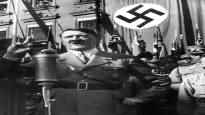The long-time throat doctor of Nazi German leader Adolf Hitler talks in his letters about a sick-crippled patient, but does not say a word about his policy.
If Carl Otto von Eickenin the hand would have slipped a few millimeters on May 23, 1935, world history would be different. Von Eicken’s scalpel was in the throat of a patient who came to the clinic under the code name “Adolf Müller” at the time.
The patient was a Nazi dictator Adolf Hitler.
But, as von Eicken wrote in a letter to his cousin, the removal of a centimeter-sized polyps proceeded unusually smoothly.
Von Eicken was the leading ear, nose and throat specialist in Germany at the time. He was also one of Hitler’s doctors from 1935 until this year’s 1945 suicide.
A Swiss member of the descendants of Von Eicken Robert Doepgen published a series of his letters describing how Hitler’s voice was handled. According to the Swiss, the letters NZZ am Sonntag (switch to another service).
Much has been written about Hitler’s habits and health. This was more or less a mental illness and feared throat cancer, among other things. By 1935, Hitler’s voice was already hoarse with much speech and violent use of sound. He feared losing his instrument altogether.
With his surgery, von Eicken restored Hitler’s tool to full condition.
Repeat to become a credit doctor
Von Eicken examined Hitler’s throat for the first time a week before the operation. According to the letters, Hitler was convinced that he was seriously ill.
“If anything bad is found, I definitely need to know,” von Eicken writes Hitler said.
Hitler and von Eicken planned the timing of the surgery together. Von Eicken could have cut right away, but Hitler had a speech to hold and the sound had to rest after the cut. Thus, surgery was performed only after the speech a week later.
Hitler was clearly pleased with von Eicken’s work, with dozens of visits over a ten-year period. Among other things, Von Eicken took care of Hitler after the 1944 assassination attempt – the bomb did not kill Hitler, but broke his eardrums.
“Why didn’t you kill Hitler?”
After the war, von Eicken was interrogated by both Americans and Russians. Russian interrogators asked why von Eicken did not kill Hitler, when there were opportunities.
– I was his doctor, not his murderer, was von Eicken’s answer. He then repeated the same answer whenever the subject came up. In his letters, von Eicken in no way expresses his attitude to Hitler’s atrocities.
Von Eicken died in 1960. 21-year-old Robert Doepgen found his letter while digging into the family archives for a school project.
– If he had slipped into his scapegoat then, I wouldn’t be here either. The whole family would have been destroyed, Doepgen tells NZZ am Sonntag.
